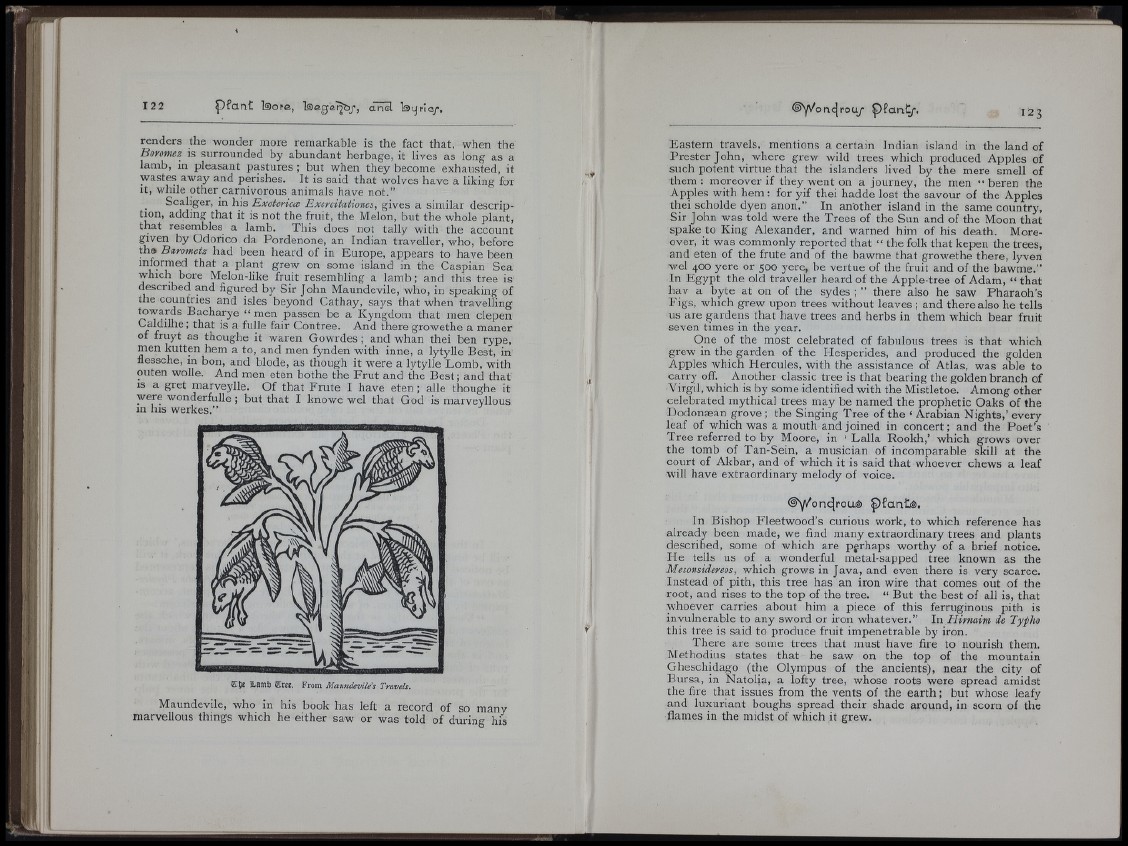
f I
'4 i
renders the wonder more remarkable is the fact that, when the
Boromez is surrounded by abundant herbage, it lives as long as a
lamb, in pleasant pastures ; but when they become exhausted, it
wastes away and perishes. It is said that wolves have a liking for
it, while other carnivorous animals have not.”
Scaliger, in his Exotericoe Exercitationcs, gives a similar description,
adding that it is not the fruit, the Melon, but the whole plant,
that resembles a lamb. This does not tally with the account
given by Odorico da Pordenone, an Indian traveller, who, before
toe Barometz had been heard of in Europe, appears to have been
informed that a plant grew on some island in the Caspian Sea
which bore Melon-like fruit resembling a lamb ; and this tree is'
described and figured by Sir John Maundevile, who, in speaking of
the countries and isles beyond Cathay, says that when travelling
towards Bacharye “ men passen be a Kyngdom that men clepen
Caldilhe ; that is a fülle fair Contree. And there growethe a maner
of fruyt as thoughe it waren Gowrdes ; and whan thei ben rype,
men kutten hem a to, and men fynden with inne, a lytylle Best, in
fiessche, in bon, and blode, as though it were a lytylle Lomb, with
quten wolle. And men eten bothe the Frut and the Best; and that
is a gret marveylle. Of that Frute I have eten ; alle thoughe it
were wonderfulle ; but that I knowe wel that God is marveyllous
m his Werkes.”
Cije ïLami) Srce. From Maundevile's Travels.
Maundevile, who in his book has left a record of so many
marvellous things which he either saw or was told of during his
123
Plastern travels, mentions a certain Indian island in the land of
Prester John, where grew wild trees which produced Apples of
such potent virtue that the islanders lived by the mere smell of
them : moreover if they went on a journey, the men “ beren the
Apples with hem : for yif thei hadde lost the savour of the Apples
thei scholde dyen anon.” In another island in the same country,
Sir John was told were the Trees of the Sun and of the Moon that
spake to King Alexander, and warned him of his death. Moreover,
it was commonly reported that “ the folk that kepen the trees,
and eten of the frute and of the bawme that growethe there, lyven
wel 400 yere or 500 yere, be vertue of the fruit and of the bawme.”
In Egypt the old traveller heard of the Apple-tree of Adam, “ that
hav a byte at on of the sydes ; ” there also he saw Pharaoh’s
b'igs, which grew upon trees without leaves ; and there also he tells
xis are gardens that have trees and herbs in them which bear fruit
seven times in the year.
One of the most celebrated of fabulous trees is that which
grew in the garden of the Hesperides, and produced the golden
Apples which Hercules, with the assistance of Atlas, was able to
carry off. Another classic tree is that bearing the golden branch of
Virgil, which is by some identified with the Mistletoe. Among other
celebrated mythical trees may be named the prophetic Oaks of the
Dodonaean grove ; the Singing Tree of the ‘ Arabian Nights,’ every
leaf of which was a mouth and joined in concert ; and the Poet’s
Tree referred to by Moore, in ‘ Lalla Rookh,’ which grows over
the tomb of Tan-Sein, a musician of incomparable skill at the
court of Akbar, and of which it is said that whoever chews a leaf
will have extraordinary melody of voice.
©Yv'onJoQ/è
In Bishop Fleetwood’s curious work, to which reference has
already been made, we find many extraordinary trees and plants
described, some of which are perhaps worthy of a brief notice.
Pie tells us of a wonderful metal-sapped tree known as the
Mesonsidereos, which grows in Java , and even there is very scarce.
Instead of pith, this tree has an iron wire that comes out of the
root, and rises to the top of the tree. “ But the best of all is, that
whoever carries about him a piece of this ferruginous pith is
invulnerable to any sword or iron whatever.” In Hirnaim de Typho
this tree is said to produce fruit impenetrable by iron.
There are some trees that must have fire to nourish them.
Methodius states that he saw on the top of the mountain
Gheschidago (the Olympus of the ancients), near the city of
Bursa, in Natolia, a lofty tree, whose roots were spread amidst
the fire that issues from the vents of the earth ; but whose leafy
and luxuriant boughs spread their shade around, in scorn of the
flames in the midst of which it grew.